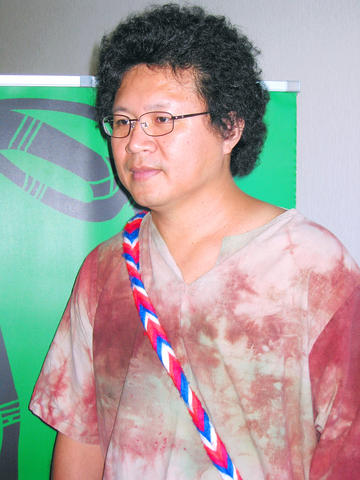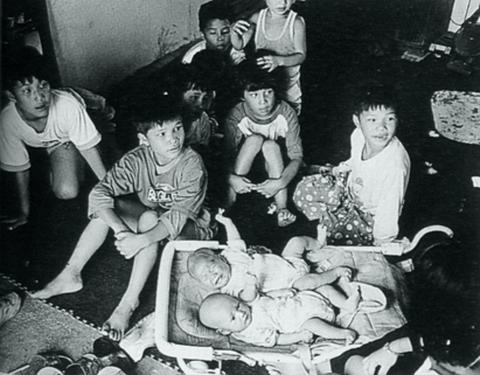Mayaw Biho (馬躍比吼) is one of Taiwan's most prolific Aboriginal documentary filmmakers with over 20 films, varying in length from around 10 minutes to over an hour, and many unfinished projects awaiting funding to his name. At 37, he has created more than enough work to annoy the powers-that-be both in the government, as well as within the Aboriginal establishment. He attributes this to his refusal to take sides. "I simply record what I see," he said.
This is, perhaps, an understatement, for Mayaw Biho admits to a broad social agenda that relates to the empowerment of Aboriginal peoples through a greater understanding of their culture and unique identity. His campaign for the use of Aboriginal names has received the most attention in recent years, and he has repeatedly denounced the government for its petty bureaucratic obstructionism on this issue. He also accepts that elders within Aboriginal communities have played their part in hindering the reversion to Aboriginal names. "If they agree [to the name rectification], this suggests that what they have been doing for all these decades has been wrong," he said, stating his position in a way calculated to please nobody.
Although Mayaw Biho uses his Aboriginal name almost exclusively, and relates closely to his identity as a member of the Pangcah community, which he regards as the correct designation for the Amis, his own ancestry is mixed. His father is Han Chinese, while his mother is Pangcah. "I come from a mixed background, so I never saw things from just a single perspective," he said. "When I was young, the things my father told me would usually fit in with what my teachers taught me at school, but when I grew up, the stuff I found interesting - that was closer to me - was from my mother's side ... . So in my work, I avoided mainstream ideas, and tried out different ways of looking at things. It can be a hard road, but I am determined to follow it, because it is also where you can find happiness and enjoyment."

PHOTO: IAN BARTHOLOMEW, TAIPEI TIMES
Before becoming a filmmaker, Mayaw Biho worked as a photographer. While serving in the navy, he recorded the doings of various high-ranking military officials. "My access to these officials, the way they acted, was all about special privilege. It was another world completely, and I felt that it was very unfair," he said.
Another experience that struck him as unfair came after he completed military service and was studying at Shih Hsin University (世新大學). On a photo expedition to Taitung, he teamed up with a number of hobbyists who wanted to take photos of Aboriginal people in their full ceremonial regalia. "They brought a couple of bottles of rice wine and some cans of coffee ... . They asked a number of old women if they minded being photographed. The woman were delighted to be asked, but this whole situation made me feel uncomfortable ... . That we were able to conclude such a transaction with a couple of bottles of rice wine [seemed wrong], and the photos we took were fake. And the fact that the old women were so delighted to pose made me even more uncomfortable."
One of Mayaw Biho's first projects, Children in Heaven (天堂小孩), remains an important artistic and political statement. Only 13 minutes long, but combining material taken over three years, the film is a visual chronicle of an Aboriginal community that lived under the Sanying Bridge (三鶯大橋) in Taipei County. Their homes were demolished repeatedly by the government, but the group persisted in rebuilding. The only commentary is provided by children, and the images are set to the soulful strains of Kimbo Hu (胡德夫) singing Am I in Heaven? (不不歌). The short film drips with irony, and though very different from his later, more conventional documentary films, it shows Mayaw Biho's disinclination to obtrude himself into his films.

PHOTO: COURTESY OF TIEFF
"It's much easier if other people do the talking," he said half jokingly.
On a more serious note, he added that he rejects the device of the voice-over to direct the perceptions of audiences. He is content to record, and focuses on many mundane aspects of the Aboriginal experience, building up a multi-layered picture of communities. One of his subjects is the Makutaay community, which feature in one of his best-known works, Dear Rice Wine, You Are Defeated (親愛的米酒妳被我打敗了). "There are only 200 to 300 people in that community, but I have already been able to make seven or eight films about different aspects of their life," he said.
"I am a regular presence," he said. "They even find it odd now when I am not carrying around my recording equipment." But his experience of how the media can manipulate the subjects that it purports to record have proved decisive in determining his cinematic technique, and his determination not to take sides. "I am only responsible for passing on the message of others," he said. "If they have disagreements, I let them have their say."
"A tribal elder rebuked me for making this film. ... But for me, the ceremonial use of wine and drinking in daily life are different issues. The use of wine in this instance has a deep cultural significance, and even though I am not a big drinker, I still support [heavy drinking during certain festivals]. This is a record, and a way of raising awareness of our culture," the filmmaker said. "I cannot be bothered to participate in their meetings about what we should and shouldn't do. I simply record. I don't even care that much whether the ceremonies are preserved."
In addition to making films, Mayaw Biho is active in promoting another trend in ethnographic filmmaking: screening films by Aboriginal filmmakers in the local communities where they were made. "It's not much point just showing them on television, for many of the mountain communities along the east coast don't have reception," he said, but in this, as with filmmaking, funding is a constant issue.
"If you don't support their [the government's] agenda for the Aborigines, it is difficult to get funding," he said. "For someone like myself, it is almost impossible to get funding from the Council of Indigenous Peoples (原民會)." The Cabinet-level agency tasked with promoting the interests of Taiwan's Aborigines is often perceived as a collaborator and toady to a broader Han Chinese agenda. "Most local documentary filmmakers will not touch politically sensitive issues. Just look at the films made about the 921 Earthquake (in 1999). It is all about the human spirit overcoming disaster, not about how government mismanagement added to the suffering. This is the really disgusting thing about documentary filmmaking in Taiwan."
A favorite target of Mayaw Biho's criticism is Taiwan Indigenous TV, established in 2004 to cater to the Aboriginal community. Lauded as Asia's first television station for Aboriginal people, it is criticized by Mayaw Biho for avoiding all the real issues. He attributes this to the lack of an independent perspective. "In order to get through school, most of the Aboriginal kids working in media have had to give the wrong answers. If they responded with an Aboriginal perspective, they would never graduate. By the time they start working, they are well trained. They know exactly how far they can go."
Mayaw Biho, despite a constant and increasingly difficult fight for funding, hopes that he can go further.
Two of Mayaw Biho's films, Carry the Paramount of Jade Mountain on My Back (揹起玉山最高峰) and Dear Rice Wine, You Are Defeated (親愛的米酒,妳被我打敗了) will be screened at the Majestic Theater (真善美戲院), located at 7F, 116 Hanzhong St, Taipei (台北市漢中街116號7樓) tomorrow at 9:20pm as part of the Taipei International Ethnographic Film Festival. Tickets are NT$160 and are available at the door.

Exceptions to the rule are sometimes revealing. For a brief few years, there was an emerging ideological split between the Democratic Progressive Party (DPP) and Chinese Nationalist Party (KMT) that appeared to be pushing the DPP in a direction that would be considered more liberal, and the KMT more conservative. In the previous column, “The KMT-DPP’s bureaucrat-led developmental state” (Dec. 11, page 12), we examined how Taiwan’s democratic system developed, and how both the two main parties largely accepted a similar consensus on how Taiwan should be run domestically and did not split along the left-right lines more familiar in

As I finally slid into the warm embrace of the hot, clifftop pool, it was a serene moment of reflection. The sound of the river reflected off the cave walls, the white of our camping lights reflected off the dark, shimmering surface of the water, and I reflected on how fortunate I was to be here. After all, the beautiful walk through narrow canyons that had brought us here had been inaccessible for five years — and will be again soon. The day had started at the Huisun Forest Area (惠蓀林場), at the end of Nantou County Route 80, north and east

Specialty sandwiches loaded with the contents of an entire charcuterie board, overflowing with sauces, creams and all manner of creative add-ons, is perhaps one of the biggest global food trends of this year. From London to New York, lines form down the block for mortadella, burrata, pistachio and more stuffed between slices of fresh sourdough, rye or focaccia. To try the trend in Taipei, Munchies Mafia is for sure the spot — could this be the best sandwich in town? Carlos from Spain and Sergio from Mexico opened this spot just seven months ago. The two met working in the

This month the government ordered a one-year block of Xiaohongshu (小紅書) or Rednote, a Chinese social media platform with more than 3 million users in Taiwan. The government pointed to widespread fraud activity on the platform, along with cybersecurity failures. Officials said that they had reached out to the company and asked it to change. However, they received no response. The pro-China parties, the Chinese Nationalist Party (KMT) and Taiwan People’s Party (TPP), immediately swung into action, denouncing the ban as an attack on free speech. This “free speech” claim was then echoed by the People’s Republic of China (PRC),